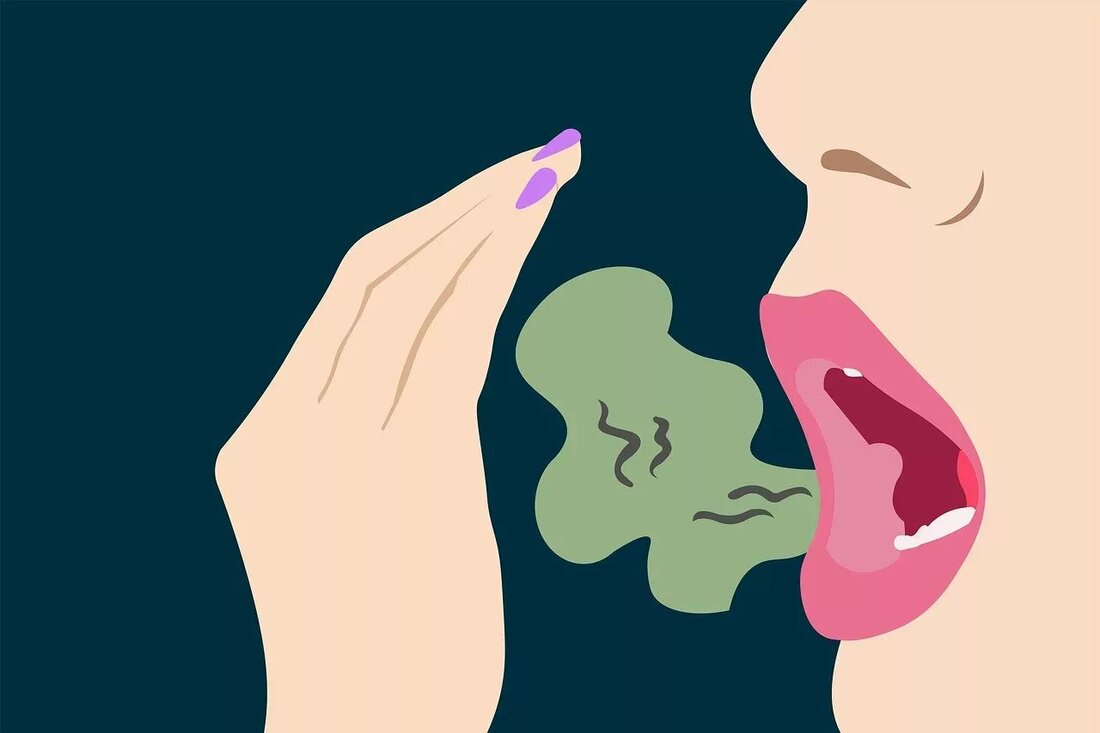Home remedies: the fight against bad breath
There are many causes of bad breath, also called halitosis. Your mouth may be the cause. The breakdown of food particles and other debris by bacteria in and around your teeth can cause a foul odor. If your mouth is dry, e.g. During certain periods, such as during sleep or after smoking, dead cells can build up and break down on your tongue, gums, and cheeks, causing the odor. Eating foods that contain strong-smelling oils, such as onions and garlic, can cause bad breath. Bad-smelling breath can also be a symptom of an illness, such as: B. a lung disease, diabetes or ...

Home remedies: the fight against bad breath
There are many causes of bad breath, also called halitosis. Your mouth may be the cause. The breakdown of food particles and other debris by bacteria in and around your teeth can cause a foul odor. If your mouth is dry, e.g. During certain periods, such as during sleep or after smoking, dead cells can build up and break down on your tongue, gums, and cheeks, causing the odor. Eating foods that contain strong-smelling oils, such as onions and garlic, can cause bad breath.
Bad-smelling breath can also be a symptom of an illness, such as: B. lung disease, diabetes or liver failure.
To reduce or prevent bad breath you should:
- Putzen Sie sich nach dem Essen die Zähne.
- Halten Sie am Arbeitsplatz eine Zahnbürste bereit, die Sie nach dem Essen benutzen können. Putzen Sie mindestens zweimal täglich mit einer fluoridhaltigen Zahnpasta, vor allem nach den Mahlzeiten. Zahnpasta mit antibakteriellen Eigenschaften reduziert nachweislich Mundgeruch.
- Verwenden Sie mindestens einmal am Tag Zahnseide.
Die richtige Verwendung von Zahnseide entfernt Speisereste und Plaque aus den Zahnzwischenräumen und hilft so, Mundgeruch zu bekämpfen. - Bürsten Sie Ihre Zunge.
Ihre Zunge beherbergt Bakterien, daher kann ein sorgfältiges Bürsten der Zunge die Geruchsbildung verringern. Menschen mit einer belegten Zunge, die durch eine starke Bakterienvermehrung (z. B. durch Rauchen oder Mundtrockenheit) entstanden ist, können einen Zungenschaber verwenden. Oder verwenden Sie eine Zahnbürste mit integriertem Zungenreiniger.
Mediale Darstellung von Mund und Zunge bei Mundgeruch oder Halitosis - Reinigen Sie Prothesen oder Zahnersatz.Wenn Sie eine Brücke oder eine Prothese tragen, reinigen Sie diese mindestens einmal täglich oder nach Anweisung Ihres Zahnarztes gründlich. Wenn Sie eine Zahnspange oder einen Mundschutz tragen, reinigen Sie diese jedes Mal, bevor Sie sie in den Mund nehmen. Ihr Zahnarzt kann Ihnen das beste Reinigungsprodukt empfehlen.
- Trinken Sie viel Wasser, um einen trockenen Mund zu vermeiden.
Um Ihren Mund feucht zu halten, verzichten Sie auf Tabak und trinken Sie viel Wasser – keinen Kaffee, keine Softdrinks oder Alkohol, die zu einem trockeneren Mund führen können. Kauen Sie Kaugummi oder lutschen Sie Bonbons – vorzugsweise ohne Zucker – um den Speichelfluss anzuregen. Bei chronischer Mundtrockenheit kann Ihnen Ihr Zahnarzt oder Arzt ein künstliches Speichelpräparat oder ein orales Medikament verschreiben, das den Speichelfluss anregt. - Passen Sie Ihre Ernährung an.
Vermeiden Sie Lebensmittel wie Zwiebeln und Knoblauch, die Mundgeruch verursachen können. Der Verzehr von zuckerhaltigen Lebensmitteln wird ebenfalls mit Mundgeruch in Verbindung gebracht. - Besorgen Sie sich regelmäßig eine neue Zahnbürste.
Wechseln Sie Ihre Zahnbürste, wenn sie ausgefranst ist – etwa alle drei bis vier Monate. Wählen Sie außerdem eine Zahnbürste mit weichen Borsten. - Vereinbaren Sie regelmäßige zahnärztliche Kontrolluntersuchungen.
Gehen Sie regelmäßig – in der Regel zweimal im Jahr – zum Zahnarzt, um Ihre Zähne oder Ihren Zahnersatz untersuchen und reinigen zu lassen. - Kauen Sie frische Petersilie.
Das Kauen von Petersilie kann den Mundgeruch vorübergehend verbessern.
List of articles on the topic of bad breath
[fu_postlist search=’stuff’ maxposts=10 search=”Bad breath”]

 Suche
Suche
 Mein Konto
Mein Konto
